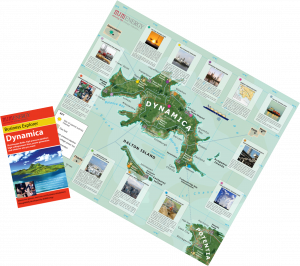
- Gas supplies – Dynamica is supplied by four offshore gas fields called Faith, Hope, Charity and Dependable. Also under certain circumstances Dynamica can import gas via an inter-connector or LNG via a new import terminal.
- Gas demand – Dynamica has a variety of gas users including power generators, chemical plants as well as commercial and domestic customers.
- Network infrastructure- Dynamica has an extensive high-pressure gas pipeline network, connecting supplies with customers and a neighbouring Island via an inter-connector. which
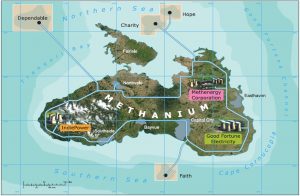
- To experience the process and practice of intense negotiation.
- To help delegates to set and manage negotiating positions.
- To expose delegates to the technical requirements of gas purchase negotiations.
This business game explores the issues associated with gas market liberalisation drawing on the framework set by the fictitious island of Dynamica using the region of Hypothermia, which is dominated by NGC (The National Gas Company of Hypothermia).
- Understanding the political dynamics of gas market liberalisation.
- Exploring different unbundling strategies.
- Developing a gas release programme in the light of ‘Take-or-pay’ contract restraints.
- Exploring gas transportation charging methodologies.
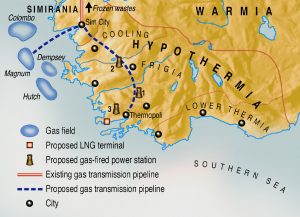
- To understand the roles and interactions between the different stakeholders.
- To understand the different stakeholder strategies use in a liberalising market.
- To explore the different legislative and regulatory components required.
The gas trading game is presented over one or two hours as part of a training course or as a stand-alone team building exercise. Gas comes into the Dynamica National Grid at two locations: the LNG import facility at Ampleton (Terminal 1) and the pipeline gas import facility at Flowing Well (Terminal 2). Gas demand in Dynamica is based on three customer groups, domestic, industrial and interruptible which are supplied at a specific price and peak day volume and demand according to local weather situations.
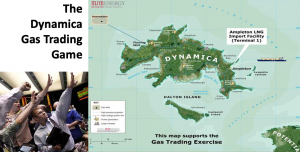
- Demand data allows each company to calculate the demand and associated income of its customers on any given day.
- Supply data which is based on gas supply contracts including parameters such a ACQ, MDQ, price, and Take-or-Pay commitments.
- Other relevant background information on the gas trading market.
Each company is required to participate a series of exercises that ultimately results in all the companies trading gas in a ‘real to life’ daily competitive gas trading market, as follows:
- Each company is encouraged to establish a gas trading strategy.
- Each company is expected to identify the different team member roles.
- Once strategies and roles have been established each company can compete in the Dynamica gas trading market.
- To experience the speed and intensity of a daily gas trading market.
- To understand the importance of supply/demand management.
- To optimize income, take-or-pay, interruptible customers and penalties in a competitive market. for failure to meet demand.
- To encourage the participants to think strategically about how to trade gas with a given gas supply and demand portfolio.
- To win!
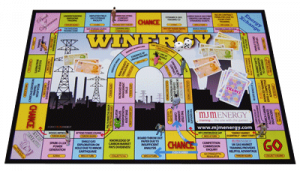
As part of your capacity building experience we enable you to get as close as you can to reality in the form of competitive games that have been designed specifically to cement the knowledge that you have been presented with in the teaching sessions. These are based on the realities of energy prices, weather upsets and even chance cards to represent real life situations.
You may experience an unscheduled shut down of your power station or an earthquake that disrupts your gas supply but you will still be expected to balance your position and maintain supply to your customers.
In order to do this, you will need to work out a strategy or use your teams problem-solving skills.
Everything is presented in a creative format, making it a fun way to experience serious scenarios and learn how to deal with them.
As well as being enjoyable and fast moving, these games will identify some very deft traders, strategic thinkers and excellent operational skills.